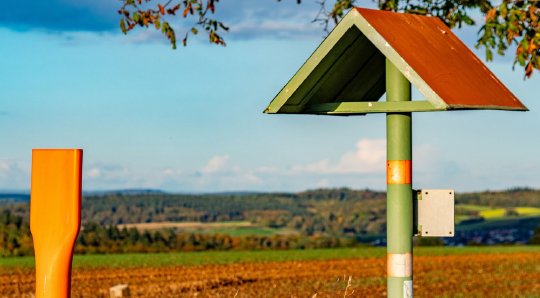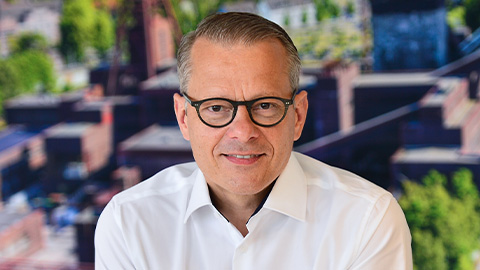

Topic of the month:
Interview with Thomas Hüwener, spokesperson for OGE's management
Interview with Thomas Hüwener, spokesperson for OGE's management
I hope you had a relaxing summer, dear readers. For many energy industry representatives, it was at least partly stressful. Both the German government and the Federal Network Agency (BNetzA) sought feedback on legislative and regulatory proposals. One particularly emotive topic is BNetzA's plans to overhaul network tariff regulation. While this issue does not play a major role in my Gasmarkt, it is highly relevant and controversial for companies and associations.
This issue features a long interview with Thomas Hüwener, the CEO of the OGE management board, in which the topic is discussed. It provides an overview of the topics of natural gas, hydrogen and CO2. All of these topics are important for OGE's current and future business. The transmission system operator's attempt to reflect this in its strategy was one of the reasons for the interview. However, Mr Hüwener also wanted to present his position on the so-called NEST process, as well as that of his company and the industry. But read it for yourself.
Storage is also a major topic in this edition. I always 'bother' you with the individual sales processes. But they demonstrate how challenging the business is, particularly in terms of capacity sales for the Rehden storage facility by Sefe Storage. You can see for yourself why possible market manipulation in the L-gas market is putting additional pressure on the storage market. The furore with which some traders reacted to this topic was remarkable.
Another rather 'obscure' topic that I have been working on over the summer is biomethane. Market developments are caught between European-driven momentum, German political restraint, and complex regulations. This became very clear over the summer. In this issue, I have attempted to outline the various aspects. There is also some positive personnel news in the biogas/biomethane sector.
Enjoy your read!

Topic of the month: Interview with Thomas Hüwener, spokesperson for OGE's management
OGE is Germany's largest transmission system operator (TSO) with a network of around 12,000 kilometres of high-pressure pipelines. The company plans to convert around 800 kilometres of natural gas pipelines to hydrogen transport as part of the development of the hydrogen core network, either alone or in joint projects with other TSOs. Additionally, almost 400 kilometres of new hydrogen pipelines are to be constructed for the core network. OGE is also increasingly involved in developing a CO2 infrastructure as an additional business segment. I spoke with Thomas Hüwener, CEO of OGE's management board, about his assessment of further market development in the natural gas, hydrogen, and CO2 sectors and how OGE is responding to these developments through its network planning and business development. Mr Hüwener was appointed as OGE's CEO just a year ago, which is also a topic of the interview. The mechanical engineer, who holds a doctorate, is very familiar with the pipeline business and the company. His career has also been a journey through the history of OGE and its predecessor companies. He began his career at Ruhrgas in 2001 as the head of a division. In 2004, he became head of the pipeline projects department at Ruhrgas Transport. Following the takeover by Eon, Ruhrgas Transport became E.ON Ruhrgas Transport in 2004, and a few years later, it was renamed Eon Gastransport. Since 2010, the TSO has been named Open Grid Europe (OGE). At that time, Mr Hüwener was head of the pipeline technology division. He has been a member of the management board since 2013.
energate Gasmarkt: Mr Hüwener, how long will OGE continue to operate natural gas pipelines?
Mr Hüwener: Officially until 2045, that's what we're committed to do. Considering the current political landscape, I wouldn't rule out the possibility that it will last even longer. [...]

Frequently asked questions
What is the energate Gasmarkt?
The energate Gasmarkt provides specialists and executives in the gas industry with up-to-date information and background information on the German and international gas market. The medium expertly explains the most important developments in the fields of market, law, politics and business. In addition, the energate Gasmarkt offers insider information such as market rumors and personal details.
What is the energate Jahresreport Gas?
The energate Jahresreport Gas traces the most important market developments of the year and provides a well-founded outlook for the coming months. Gas expert and insider Dr. Heiko Lohmann analyzes relevant events in politics, law and regulation as well as on generation, infrastructure and trade. In addition, the report provides information on changes in the corporate landscape and tracks price developments in market reports. Top decision-makers from the industry use the Jahresreport Gas as a compact chronicle of the year and to assess future market developments.
How often are these publications released and in which formats are they available?
The energate Gasmarkt is published monthly. Subscribers will receive the energate Gasmarkt as a print and PDF version in German and English. The Jahresreport Gas is published annually (beginning of December).
Can I purchase individual issues of the energate Gasmarkt?
Yes, you can purchase individual isses as print or PDF version. Payment options include purchase on account, credit card or PayPal.
How much is a subscription of the energate Gasmarkt and how much does the Jahresreport cost?
A subscription to the energate Gasmarkt (single licence) costs 110,- Euro/month (plus VAT). An edition of the Jahresreport Gas costs regularly 390,- euro (plus VAT).
Are there any special conditions if several employees in a company would like to receive the Gasmarkt?
With several Gasmarkt recipients in one company, the price of the second and all other licenses is reduced significantly. We are happy to make you a fair offer for team or corporate licenses!
What benefits do I get by registering?
A free energate account is required to order the energate Gasmarkt or the energate Jahresreport Gas. Registered users receive an overview of the contents of the current issue of energate Gasmarkt by e-mail on the day of publication.
I would like to read energate Gasmarkt or energate Jahresreport Gas digitally. Where can I find my e-paper version?
As a subscriber to energate Gasmarkt or as a purchaser of energate Jahresreport Gas, you will also receive an e-paper version in addition to the print edition. You can find it at online.energate-gasmarkt.de. Please use your energate account to log in.

